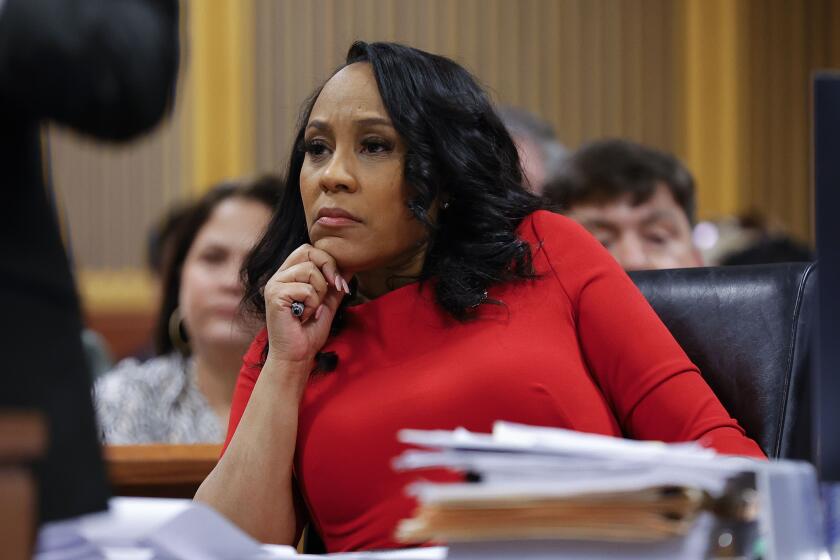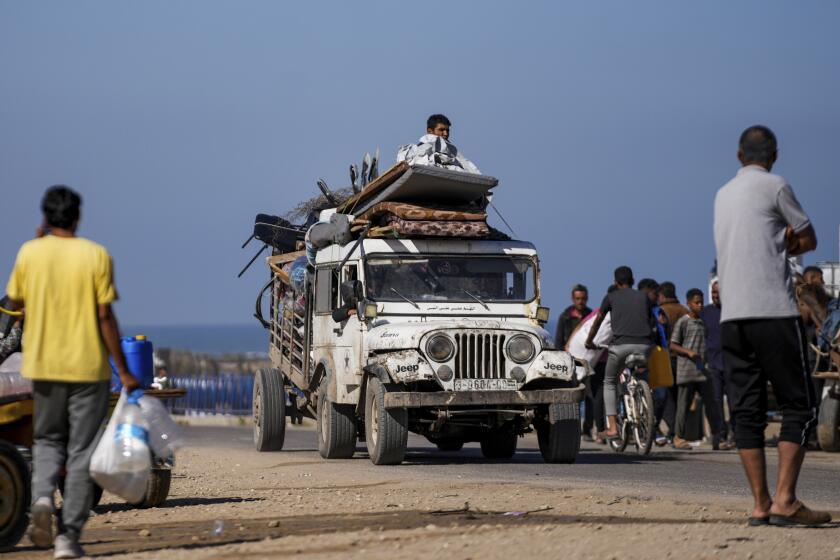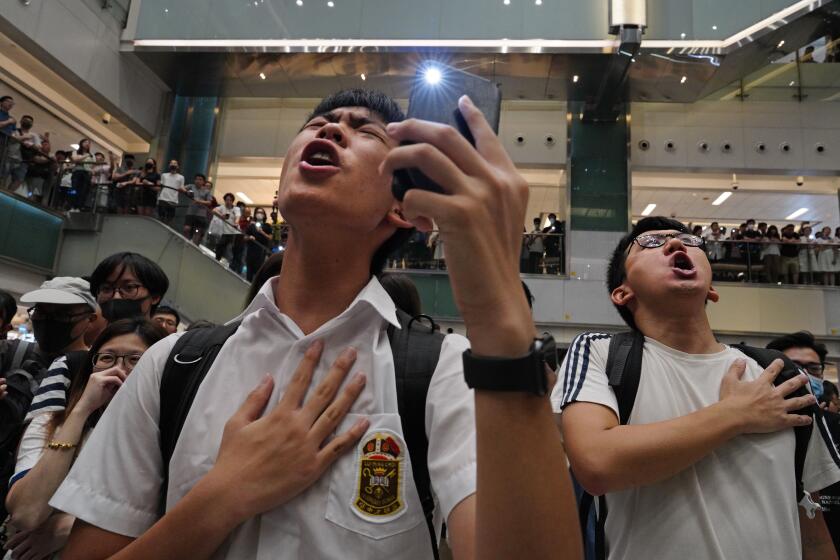Rising Violence Imperils Reform in El Salvador
Almost a year after El Salvador’s decade-old civil war ended with fanfare and high hopes, a U.N.-brokered peace is in danger of crumbling amid mounting political violence, deepening fear and delays in promised reforms.
With this country’s most important elections ever looming on the horizon, a resurgence of death squad-style killings has sent a chill of tension and anger throughout much of Salvadoran society.
Two senior leaders of the former guerrilla Farabundo Marti National Liberation Front were murdered in one week’s time. A right-wing city official was slain days later.
A total of 25 leftists and three rightists have been killed this year--nine in the last several weeks--and numerous people from both sides have been threatened with death.
Adding to the climate of mistrust, key elements of the U.N.-sponsored peace accords--an ambitious land-distribution program and the creation of a civilian police force--have been crippled by government resistance, diplomats say.
Both are seen as crucial to building lasting peace and bringing democracy to El Salvador as it struggles to heal the wounds of war.
For most of the last year, El Salvador had been hailed as the United Nations’ brightest success in a troubled world.
Now, tensions have soared to such extremes that leftist leaders are publicly accusing prominent business people of financing death squads; the United Nations and the Clinton Administration dispatched emergency missions to El Salvador; foreign embassies broke their customary silence to complain openly about a new round of alleged government phone-tapping.
And a march by angry FMLN supporters last week honoring six Jesuit priests slain by the army four years ago only narrowly missed becoming a rampage through San Salvador’s wealthiest neighborhoods, sources say.
At the last minute, leaders called off the planned protest, but they warn that they are not sure how much longer they can control their ranks.
“There is so much rage on our side and so much rancor on the other side,” said a dispirited Ana Guadalupe Martinez, an FMLN leader who helped negotiate the war’s end. “All of the work that went into creating a sense of security and trust is gone. We are back to zero.”
Under U.N. guidance, a cease-fire held for a full year in El Salvador until the final accords were signed last Dec. 15, bringing peace to the Cold War’s bloodiest Central American battleground after 12 years of fratricide.
War between the Marxist FMLN guerrillas and a series of U.S.-backed governments claimed about 75,000 lives, the majority of them civilians.
The accords required the government to institute major military and political reforms, while the FMLN was required to disarm and become a political party.
In the last year, this country saw remarkable change.
Former guerrilla commanders opened headquarters in central San Salvador and entered campaigns for public office. The army was cut in half, while residents began to move about freely, enjoy a night life after years of curfew and engage openly in political debate.
But many are now wondering if the changes were superficial.
Suddenly, in the wake of the killings and threats, former rebel leaders have added bodyguards and are changing their routines to avoid being followed.
Fresh graffiti appears daily, demanding “elections without death squads” and warning of more violence.
Groups of priests, peasants and leftists are staging hunger strikes at churches in the capital and in the countryside.
The peace process has hit crises before, most notably when it was revealed in May that the former rebels had secretly retained a stockpile of weapons, including antiaircraft missiles.
But that scandal, which devastated FMLN credibility, did not lead to the kind of uneasiness that now fills the air.
“I am struck--let us not mince words--by the amount of fear present, which is something that was not present 11 months ago,” said a senior diplomat involved in the peace process.
U.N. officials, knowledgeable sources say, have concluded that there appears to be an “organized campaign” against FMLN supporters and some of their leaders, possibly aimed at discouraging participation in the March 20 presidential and National Assembly elections.
These will be the first elections in Salvadoran history in which the left will have a significant role, and the left has been showing strength recently in attracting members and support.
About two dozen FMLN members have been killed this year, but almost always in ambiguous circumstances. The pattern changed on Oct. 25: Francisco Velis, a member of the FMLN leadership, was shot point-blank in the face as he escorted his daughter to a day-care center.
Five days later, Heleno Hernan Castro, a popular former comandante involved in the land-distribution program, was killed on a remote rural road. (The government is expected to announce that the Hernan Castro slaying was a common crime, the product of a traffic altercation.)
The following week, Julio Araniva, a municipal official representing the government’s right-wing Nationalist Republican Alliance party, known as Arena, was killed. Four other FMLN members and two Arena militants were also slain.
FMLN supporters later attacked the offices of El Diario de Hoy, a right-wing newspaper whose owners have been accused of supporting death squads, an allegation they deny.
Many in the opposition, recalling El Salvador’s history of unpunished political crime, have little faith that the violence will be adequately investigated.
The United Nations and church officials have denounced what they call an alarming resurgence of apparent death squad killings, reviving memories of a brutal past.
Right-wing death squads terrorized El Salvador for much of the 1980s, eliminating tens of thousands of people suspected of sympathizing with the guerrillas.
Diplomats, politicians and some people on the right agree that, if the crimes are not solved in a way that the public finds believable, a spiral of violence and revenge is likely to follow.
President Alfredo Cristiani’s government has pledged to investigate the violence.
“Those of us who have worked so hard to achieve peace in El Salvador are the most interested in the process not being disturbed,” Cristiani said. “My opinion is that there is no crisis and that the peace process will continue.”
Yet a weeklong emergency visit by U.N. Undersecretary General Marrack Goulding failed to persuade the government and FMLN to agree on an investigative commission, further casting doubt that the cases will be fully aired.
The violence “is especially serious in the sense that it erodes the fundamental ingredient of the peace process: confidence, credibility, the guarantee that social problems and political demands can be solved by institutional means, not by violence,” said Diego Garcia Sayan, head of the human rights division of the U.N. peacekeeping mission here.
“If in the past there were certain delays and failures to comply (with the accords) that threatened the process, the current circumstances are far and away more grave and more delicate,” he said. “If you are afraid to participate in the electoral process, if you are afraid to run for mayor, if you are afraid to attend a political meeting . . . then the very raison d’etre of the peace process . . . its very essence, is being diminished.”
A national debate on death squads was further stirred when the American government released about 12,000 declassified documents that, among other things, implicated current government officials and members of Cristiani’s Arena party in assassinations, bombings and other death-squad activities.
Insisting that they were the victims of an American conspiracy, government officials denied the allegations and dismissed the documents as rumors and gossip.
Most critical to the success of the peace process is the building of a professional, apolitical police force designed to replace police agencies that have long been associated with death squads and kidnapings.
“If you don’t have a public security force that (Salvadorans) can have confidence in, then you don’t have a democratic society that can function,” U.S. Ambassador Alan H. Flanigan said.
But instead of fully supporting the new civilian police established by the peace accords, the government has quietly maintained the dreaded militarized National Police, U.N. officials say.
After repeated delays, the government finally agreed to disband the National Police by next October, but the United Nations will not accept the timetable because it allows the force to remain largely intact well into the next government, sources said.
The other key element of the peace accords--giving more than 20,000 acres to 45,000 former combatants from both sides of the war--is also seriously delayed. Fewer than 10% of the intended beneficiaries have received land.
U.N. officials say some of the delays are bureaucratic, some can be blamed on the FMLN, which was slow in drafting lists of eligible members.
But the biggest problem, these sources say, is government resistance to the plan.
The officials put in charge of the program belong to the most hard-line faction of the Arena party, the sources say, and have little interest in helping their former enemies.
More to Read
Start your day right
Sign up for Essential California for news, features and recommendations from the L.A. Times and beyond in your inbox six days a week.
You may occasionally receive promotional content from the Los Angeles Times.







